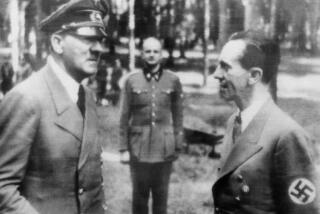How Firm Is Gorbachev’s War on Deceit?
- Share via
By all indications, Mikhail S. Gorbachev took stock in the heritage that he received from Leonid I. Brezhnev and came to he conclusion that any progress in the Soviet Union would be impossible unless he could eradicate, or at least significantly weaken, the deceit that has penetrated all cells of Soviet life.
Despite early fears that the new leader was resorting only to a ritualistic condemnation of the lies prospering in Soviet society, it became obvious after the 25th Party Congress in February that Gorbachev really was serious about his campaign for “openness.” It was as if the Soviet leader had decided to support Alexander Solzhenitsyn’s famous appeal to Russians in the early 1970s to “stop living by the lie.”
After the party congress, Gorbachev’s offensive gained momentum. For example, a few weeks ago Pravda attacked the party committee in Pskov for confiscating an issue of its own newspaper because an article in it had denounced “a Potemkin village” built by party officials in the region. In an unprecedented action, Pravda published copies of the initial critical article and the second article, from which all unpleasant things about local bosses had vanished.
In another unheard-of development, Boris Eltsin, the first secretary of the Moscow Party Committee and one of Gorbachev’s most zealous lieutenants, appeared at a meeting of propagandists and broke from the practice of having aides select politically unembarrassing questions for him to answer. For more than six hours he responded to more than 600 questions, avoiding none.
But the most remarkable thing was Gorbachev’s decision to enlist the intellectual community, particularly writers, in his campaign against the lie. By December Yevgeny Yevtushenko, clearly chosen by the Kremlin to be a herald of the anti-lie crusade, demanded that his colleagues cease distorting the present and history. Three outstanding Soviet writers--Valentin Rasputin, Viktor Astafiev and Vasil Bykov--published novels almost simultaneously that depicted life in a manner diametrically opposed to the official ideology. At the same time, Moscow and Leningrad theaters began to compete with each other in denunciation of the lie as a Soviet institution. Leading figures in the theater and movie industries also demanded the abolition of censorship.
A few days before the Congress of Soviet Writers opened in June, Gorbachev received a group of prominent authors and instigated them to take an aggressive stance against official lies.
Not surprisingly, the congress was turned into the most spectacular such gathering in many decades. Several writers spoke of truth as the main social issue. Only a few years ago their speeches would have been labeled as nasty libels and compared to the anti-communist denunciation fabricated by the CIA.
There should be no illusion about the scope of the warfare for honesty in Soviet society. So far the campaign has touched only the tip of the gigantic iceberg of lies and myths amassed over the almost seven decades of the Soviet Union’s existence. The Soviet mass media and textbooks have not significantly changed their presentation of life inside or outside the country. Gorbachev himself has made it only, at best, halfway in his attempt to emancipate his style from that of his predecessors. His speech on the Chernobyl disaster, coming with a delay of two weeks, was disappointing and followed the old Soviet standards.
Even more important is that Gorbachev’s regime continues, with clear Stalinist overtones, to be implacable so far toward dissidents and hostile to emigration. His speech last month in Warsaw clearly indicated the determination of the Soviet Union to ignore the sovereignty of East European countries.
The Soviet people watch what is going on in the Kremlin as though they were spectators at a suspenseful play. They ask themselves how far the current master will go. Will he, for instance, be consistent enough to declare Soviet elections, with one candidate on the slate and a 99% “yes” vote, as a big farce? Will he acknowledge that the official dogma about the working class having the leading role in Soviet society is ludicrous?
Gorbachev’s campaign for openness has, like his other actions, polarized the Soviet population. But most of both his well- and ill-wishers are united in the conviction that any further step forward in the fight against lying would demand radical changes in the Soviet political system, which is, after all, based on secrecy and on the manipulation of information. Since these sorts of basic changes are very unlikely, Soviets look on this campaign with great skepticism. It is definitely opposed by apparatchiks , many of whom are certain that it is only a matter of time before the new course, which rocks the state boat, will collapse. Unfortunately, the predictions of these angry bureaucrats may turn out to be correct.
More to Read
Sign up for Essential California
The most important California stories and recommendations in your inbox every morning.
You may occasionally receive promotional content from the Los Angeles Times.










